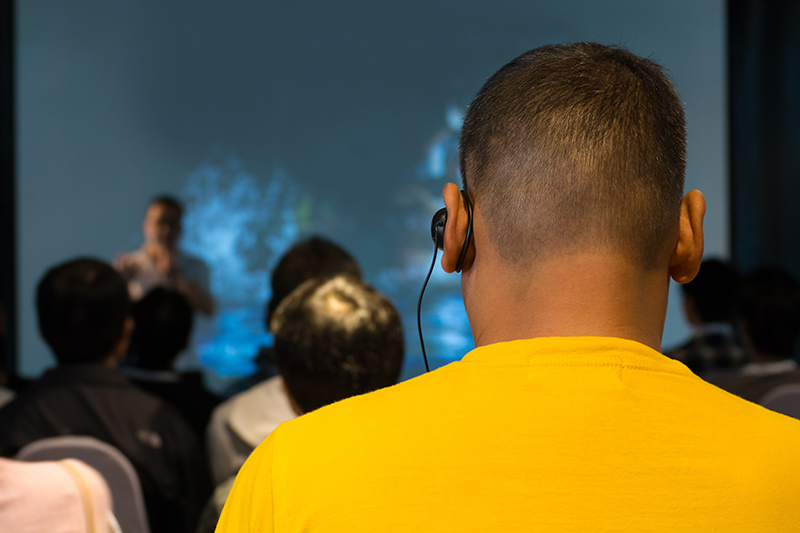Perhaps you’re putting on a workshop, or maybe you’re hosting a trade show. No matter the size or the purpose of your event, there’s a good chance that you may need event interpretation services. As your business or association expands, this need is likely to grow. While most organizations will need to rely on professional event interpretation providers to ensure the most successful event possible, there are ways in which to prepare.
Why opt for professional event interpretation?
Your message deserves to be heard. It also deserves to be heard in a way that makes a meaningful impact. While it seems as though the internet abounds with countless interpretation options, skilled professionals will clarify your meaning and help you to avoid embarrassing gaffes. If participants are left with more questions than answers, you could jeopardize the credibility of your company. If people are left feeling insulted, the impact could be far worse.
Professional event interpretation is the antidote to questionable online guessing games. A team of skilled professionals is not only well versed in the language, but also understands the skills, techniques, and equipment required to provide interpretation services at an event, regardless of its scale. From small meetings to entire conventions, professional event interpretation teams will get the job done right.
Event translation styles
Depending on the logistics of your event, there are two different styles of event translation to consider: live simultaneous interpretation and remote simultaneous interpretation. Understanding a little bit more about the differences between these two style types can help you decide which one is right for you and your attendees.
Live simultaneous interpretation
This style of event translation is probably the one that comes to mind when you first think about interpretation. With live simultaneous interpretation, an interpreter simultaneously interprets what a speaker is saying as she/he is saying it. They are also interpreting live, usually from a sound-proof booth specifically designed for the purpose. Because interpretation is scalable, this style of event interpretation is appropriate for both smaller settings such as board meetings all the way up to heavily attended multilingual conferences.
Remote simultaneous interpretation

Another professional interpretation option is remote simultaneous interpretation (RSI). With RSI, audience participants are able to listen to the event using headphones and electronic devices such as smartphones and tablets. The source language audio is interpreted into their native languages in real-time. The benefits of remote simultaneous interpretation include increased flexibility, shorter ramp-up time, and reduced costs. Web meetings and international conferences are two ideal candidates for remote simultaneous interpretation given their large attendee potential. However, RSI is suitable for any type of event.
What can I do to prepare for event interpretation?
Working with a professional event interpretation team should put your mind at ease, especially one like Interpro that offers turnkey interpretation services. Even so, since you want your work to be as efficient as possible, there are some factors to take into consideration:
1. Timing is everything.
If you think that event interpretation is appropriate for your company’s next event, be sure to plan in advance. While professional teams can work quickly, and RSI has a shorter ramp-up time, booking your event interpreter well in advance is crucial as it ensures the right interpreter will be available for your event.
2. Details matter.
The size and location of your event will determine the most effective interpretation style for your event. The more details that you can address – as far in advance as possible – the better. You will want to consider the logistics of the event, such as presentations, lectures, community meetings, and venue. You will need to identify the language(s) that your participants will require. Finally, you need to consider the size of your audience, as well as the number of speakers who will be presenting. Understanding and planning for all aspects of event interpretation is essential.
What else can I do to ensure a successful event?
Whether you’ve opted for traditional or remote simultaneous interpretation, taking care of a few small details the day of the event will go a long way to ensuring success.
1. Double check the equipment.
A professional interpretation team will ensure that the right equipment is available, set up, and ready to go. However, there are several items you will want to test the day of the event:
- Make sure the Wi-Fi is up and that everyone is able to access it easily.
- Test all of the technology your speakers will be using, including PCs/laptops, projectors, and clickers.
2. Bring extra copies of materials.
In the time leading up to your event, you’ll collaborate with an event interpretation team as well as your team’s dedicated Project Manager. During that time, you’ll share information about the event, including topics covered. The day of the event, it is useful to have extra copies of materials to distribute to your interpreters, just in case.
3. Check in with your speakers.
Interpreters are skilled at capturing a speaker’s exact meaning. Still, you will want to remind your speakers of a few things in advance. They should know to:
- Enunciate clearly;
- Speak loudly, but refrain from shouting;
- Avoid slang whenever possible.
Speakers don’t need to make major modifications to their delivery. In fact, these tips constitute basic speaking techniques that any professional presenter would be aware of.
Final thoughts
From business meetings held in board rooms, to keynote sessions taking place at convention centers, events of all sizes can benefit from event interpretation. Partnering with a professional interpretation organization like Interpro will ensure that your message will be communicated accurately and clearly. Taking these steps during the initial planning process and on the day of the event will ensure the success of your event, and the satisfaction of every participant.

